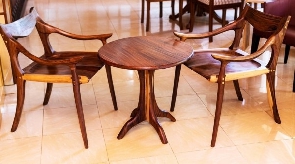Domestic furniture makers have bemoaned the continuous increase in prices of raw materials, a situation they say is adversely affecting the sustainability of the industry.
Despite the cedi having appreciated against the dollar this year, as well as the reduction in fuel prices, industry players say they are faced with the risk of incessant rising cost of production due to high raw material prices and utilities, particularly electricity.
The situation is fuelling anxiety among players in the domestic furniture sector about the future prospects of the industry. They are particularly concerned that imports could take their market if steps are not taken to bring down production cost.
According to the Chief Executive Officer of Pokus Furniture Works, Paul Kusi, who doubles as the Chairman of East Legon Artisans in Accra, prices of materials, especially foams, have been increased on four occasions in the first three months of this year, leading to fears that the industry could collapse.
He added that any time prices of fuel go up, foam manufacturers are quick to increase their prices yet refuse to reduce it when there is a reduction in the prices of fuel.
“The main reason that has led to the slow pace in the furniture market is the cost of foams. The two major producers of foams in the country are always increasing the prices such that whenever there is an increase in the prices of fuel, they also increase the prices of their products and they do this without giving us prior notice.
“Our work is largely dependent on foam, therefore, any time its price surges, it has a direct impact on the prices of the furniture, hence, making it difficult for people to purchase and this affects the industry at large,” he explained.
The high cost of foam is not the only factor threatening local furniture makers. Prices of other materials, such as wood and leather, after shooting up significantly during the peak of the cedi’s depreciation and high fuel prices last year, have remained high despite the appreciation of the cedi and reduction in ex-pump prices of fuel.
For instance, Mr. Poku noted that a six by two inches piece of wood that sold at GH¢40 at the beginning of last year, is currently selling at GH¢100.
Similarly, recounting the price of a yard of leather last year, he said it was GH¢25 but now goes for GH¢45. The high cost of raw materials, he lamented, is increasingly making locally made furniture more expensive than imported ones, a situation he believes could push thousands of artisans and players along the value chain out of business, if not checked.
He particularly wondered why prices of these materials have remained high despite the relative stability in the domestic currency since last December, as well as the reduction in global crude prices.
Globally, the furniture market size was valued at US$48.5billion in 2021 and is predicted to reach US$78.06billion by 2030, growing at a compound average rate (CAGR) of 5.4 percent from 2022-2030.
Mr. Kusi also lamented that financial institutions have turned their back on the industry at its most important point of need.
Meanwhile, an artisan at Pokus Furniture, Kwame, bemoaned the poor quality of the foams sold on the market, saying despite the high prices, they are of low standard.
Comparing the imported foams to the local ones, he said the former is better and durable than the latter since they last longer. “Most customers, after purchasing our furniture made of the local foams, return them within six months or a year due its poor quality”.
Another artisan, Akwasi Antwi of Adom Furniture, lamented how the recent cost of materials is having a negative impact on the industry, saying: “Previously the price of an L-shape type of furniture ranged from GH¢1,400 – GH¢1,500, but now we are selling it at GH¢2,000. At this price, buyers are always complaining that it is too expensive.
Currently, the strategy Mr. Kusi has adopted to survive amid the challenges is to give out furniture to loyal clients on credit.
He revealed that many of his colleagues are currently out of business due to the challenging environment caused by the unreasonable hikes in raw material prices and utilities.
Similarly, Chief Executive Officer of Odum furniture, Kwame Odum, concurred with the challenges his fellow artisans have identified. He, however, urged industry players to take branding seriously and be innovative.
Just like any other industry, Mr. Odum said branding and innovation are key to survival and that nowadays, clients come along with designs they have seen on YouTube and other social media platforms, hence, appropriate for producers to be abreast with the new trends in order achieve customer satisfaction and retention.
“In recent times, all information is available on the Internet, so the onus lies on the individual to take advantage of the Internet to learn different designs in order to match up with the latest trend.” he said.
Business News of Monday, 27 March 2023
Source: thebftonline.com

















